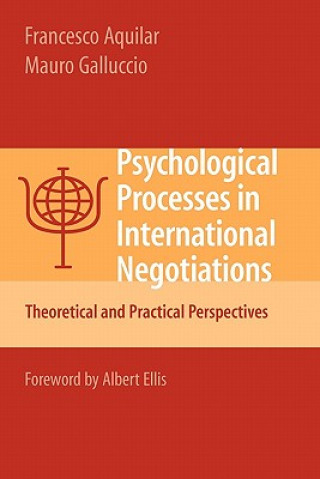
Dostava
Savjetnik za kupnju





Proizvod vam ne odgovara? Nema veze! Možete nam vratiti unutar 30 dana
 Poklon bon
u bilo kojoj vrijednosti
Poklon bon
u bilo kojoj vrijednosti
S poklon bonom ne možete pogriješiti. Za poklon bon primatelj može odabrati bilo što iz naše ponude.
Psychological Processes in International Negotiations
 Engleski
Engleski
 154 b
154 b
30 dana za povrat kupljenih proizvoda


A unique collaboration between experts in cognitive psychotherapy and political science, this book emphasizes the value of human psychology in negotiation and mediation. Drawing on a wide range of theory and data, from neuroscientific findings and historical events to the rational-emotive model of behavior, the book explains how the negotiation process works, under both adverse and optimum conditions.Global interests are at stake at the treaty table. But personalities on either side can create difficulties apart from the issues. A skilled negotiator needs to be able to defuse the tensions and misperceptions that can derail progress. But there are few resources that offer a combination of psychological knowledge with the skills of persuasion.§Now, a unique collaboration between experts in cognitive psychotherapy and political science, Psychological Processes in International Negotiations provides such a resource. Drawing on a wide range of theory and data, from neuroscientific findings and historical events to Albert Ellis rational-emotive model of behavior to attachment and meta-cognitive functions, the book explains how the negotiation process works, under both adverse and optimum conditions. The authors identify psychological elements (in participants and in negotiators themselves) that have the greatest effect on negotiation outcomes, including group identity and groupthink, egocentrism, emotional awareness and competence, and the various interpersonal and communication skills, as well as steps readers can take to improve their performance. With this book, negotiators have the tools to come to clear judgments and creative, non-aggressive solutions. §Highlights of the coverage:§Cognition and emotion in the context of negotiation.§Characteristics/traits of successful, proactive negotiators.§Cognitive views of war and international crisis.§Meta-communications and the working relationship.§Emotive keys to coping with stalemates.§Summaries of a 15-session cognitive/emotional training program for negotiators, and the proposed European Cognitive School of International Negotiation.§"Practical guide" sections linking theoretical and practical material.§This synthesis of scientific insights and real-world applications makes Psychological Processes in International Negotiations necessary reading for negotiators, mediators, and conflict managers, psychologists, and psychotherapists, as well as for students and researchers in this field. The authors premise is clear: peace and stability create winners on all sides.
Informacije o knjizi
 Engleski
Engleski




 Kako kupovati
Kako kupovati















